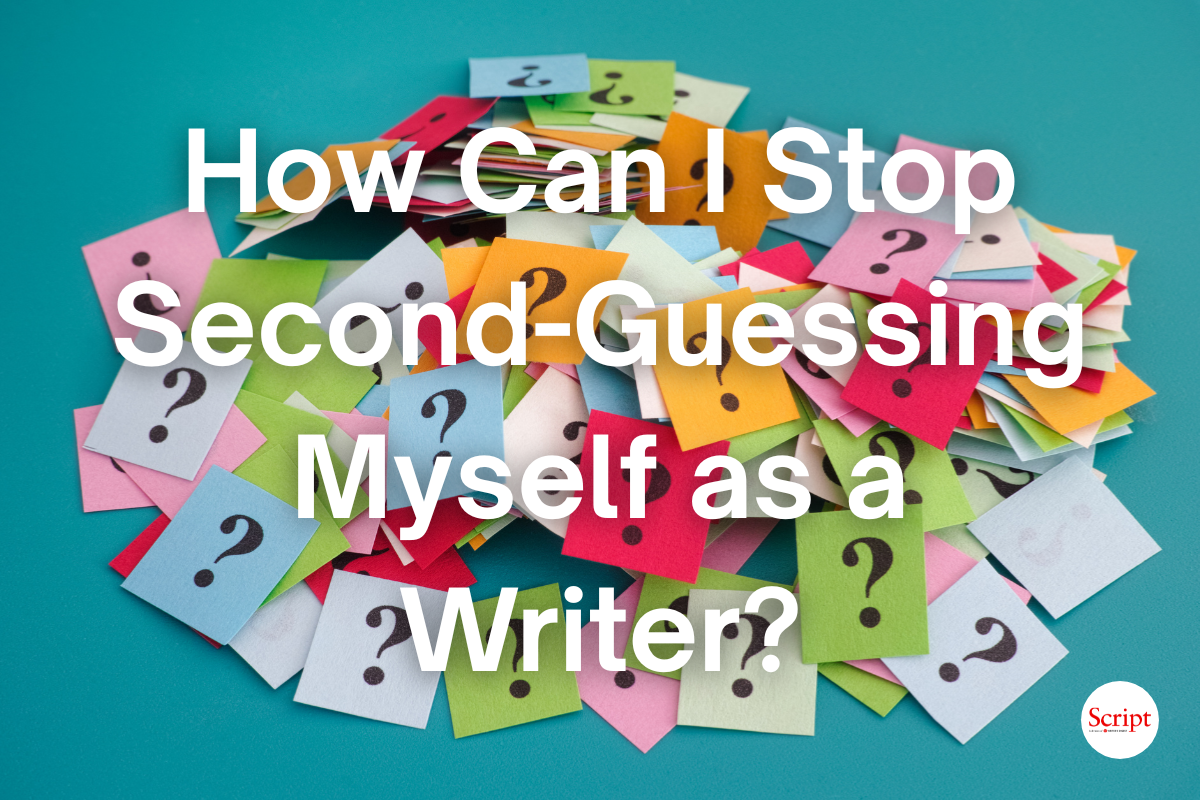Why Am I Stalled With Writing?
Writing coach and Called to Write founder Jenna Avery responds to a reader about stalling with writing and how to recover.
Welcome to “Ask the Coach.” As a writing coach, I answer questions from writers about making the work of writing happen, tackling craft, business, and personal questions along the way. (Have a question you’d like answered? Check the details at the end of the article about how to submit one.)
Today I’m responding to a writer who’s commented about feeling like they’ve stalled around writing.
“I’ve made so much progress with my draft but… I’ve just stalled again, and I have no idea why. I’m just not FEELING it right now. What gives?”
Whew, yes. SO many writers I’ve spoken to recently are feeling similarly. Let’s unpack some of the possibilities for underlying causes and then brainstorm how to recover from the stall.
Why Writers Stall
The truth is, there are many reasons for stalling out with writing, and since I’m not getting into specifics with you personally, I can’t be sure what’s happening for you, but I’ll lay out some common possibilities.
1. All the *everything* right now is zapping you.
There’s so much going on right now — particularly in the U.S. — that’s destabilizing and concerning, it’s hard not to be affected unless you’re deliberately hiding out. And even if you are, there’s plenty of fear, anxiety, and angst in the zeitgeist for anyone with a heart to pick up on.
Either way, this makes it hard to keep writing — and fear is a creativity killer. It activates the fight-flight part of your brain, which is not the part that supports creative thinking and flow states, so anytime you’re in a fearful place, it’s much, much harder to write.
Everything going on can make us question the value and relevance of our creative work as well.
2. Personal life stuff is getting to you.
Writers may also stall with writing when their personal life circumstances take a toll. Whether it’s getting taxes done (raises hand), managing kids and households (ditto), dealing with physical, mental, and emotional illnesses and challenges, navigating complex relationships, getting caught up in happy life events (weddings, birthdays, babies!), or dealing with losses of varying sorts, these life occurrences have an impact on us, particularly in the way they disrupt our writing routine, but also in the stress that builds up in response.
I’m not a “you have to have a thick skin” advocate when it comes to writers; we need access to our heart-on-the-sleeve emotions to write. (There’s a “thick skin” middle ground when it comes to getting notes and the marketing side of things, but that has to do with mindset more than skin.) But being more empathetic beings means we also may be more impacted by what we’re dealing with, personally and globally. And even the good stuff is disruptive, too.
3. You’re reacting to a mountain (or an iceberg) in your story.
Sometimes there are obstacles in our stories we maybe haven’t quite admitted to ourselves but are causing us to stall out or avoid working. I’ve had scenes to write — a beloved character dying, for example — where I’ve been aware of the inexorable march toward the doom of writing that scene, wanting, wishing, and hoping there was some way to avoid it, but eventually having to face it.
Or you might have work to do to solve a particular story problem you aren’t trusting ourselves to solve, so rather than go into it, you avoid it. These “mountains” can feel insurmountable, leading us to avoid addressing them, which manifests as stalling.
Perhaps worst of all are the “icebergs” — the story problems you intuitively know are there but haven’t acknowledged yet. Which means deep down, you know there’s a problem, and you’re avoiding finding out what it is.
4. You’ve lost confidence in yourself as a writer.
Another reason writers stall is if you’ve lost confidence in yourself.
Confidence losses can come about as the result of negative or poorly delivered feedback or doubting your capability in ability to succeed in your efforts, which can run the gamut from figuring out specific story beats to selling a script to navigating a deal. Not believing you have what it takes is undermining, though entirely common.
I’ve always loved what one of my mentors said to me once, which was (paraphrased), “You only have to be the person capable of writing this story by the time you’re done with it.” In other words, you’ll grow into it as you do the work, so do it anyway.
5. You feel overwhelmed by the quantity of work ahead.
Sometimes writers shut down or “stall” simply because they feel overwhelmed by the quantity of work ahead, whether that’s breaking a new concept, how much more they have left to write in a current draft, or by the lengths of revisions ahead.
Similarly, the feeling of not knowing how to solve a story challenge can be equally off-putting (those mountains and icebergs, above).
The temptation in these instances is to avoid writing altogether, either to put off facing the overwhelm or “wait” until the answer to the challenge presents itself or until one feels “in the mood” to write. The problem here is that this collection of particular issues doesn’t typically resolve with waiting or avoiding (none of it does, really, other than perhaps the personal challenges).
6. Your writing practice has been disrupted and resistance has crept in.
Another way of looking at the possibilities I’ve described above is simply that your writing practice has been disrupted by something. And when our practice gets disrupted, the more time that passes after you last wrote, the harder it is to restart. This is resistance.
This is why it’s valuable to focus on writing consistently, even if you’re hitting just a “rock bottom minimum” amount of writing, such as a mere 5 minutes a day. This is also why it helps to write at least somewhat consistently. I used to suggest aiming for 5 to 7 days per week, but I’ve found that even 3 to 4 days per week can be sustainable. And, as a tool, if you’ve gotten off track, writing a little bit everyday can be a jumpstart.
Which means I’ve strayed into the area of recovering and restarting. So, let’s explore some options to help you recover from a writing stall and get back on track.
How to Recover From a Stall
(As I write this, it occurs to me how this feels similar to a plane stalling, not that I’m a pilot, but from what I understand, the trick is to get the engine restarted as quickly as possible so the plane doesn’t crash!)
1. Write for a little tiny bit, right now.
Get out a timer, tell yourself you only have to write for five minutes (or even one), press Start, and go. Very often you’ll find yourself off and running. The reason this works is that it tricks your brain past the fear and overwhelm and into action, and once you’re there — and not dying from tiger attacks or whatever terror is lurking in the background — it’s easier to keep going or do it again tomorrow.
2. Write morning pages.
Morning pages are a simple tool for recovering creatives and writers. The process is to write three pages, ideally long-hand (though many people use 750words.com), and just vent, thought-dump, whine, and process until you get to the end. It’s a remarkable way to reconnect yourself to words on the page, and very often leads to personal insight and clarity if you stick with it past the initial complaints that are likely to show up. Not re-reading and/or shredding the pages is encouraged.
3. Write about writing.
Alternatively, get out your journal to write about writing. This can help you uncover any lurking fears and doubts that might be tripping you up, making it easier to draw on your inner courage and insight to move forward with the work anyway.
A journal is also an excellent place to “write outside the draft” to try out story possibilities or brainstorm with your characters about solutions you might not want to try in the confines of the script itself.
4. Rewrite your fears and doubts.
When you’re aware of what fears and doubts are coming up, you can rewrite them. A technique I use with clients (and myself) is to “fear storm” all the worries down onto paper, then rewrite them from a more supportive stance. For example, “I can’t do this,” might become, “I haven’t done this yet, but I’m going to give a solid go regardless.”
5. Calm your fight or flight response.
At a recent meeting of my Called to Write community, we reviewed techniques to soothe our nervous systems, get out of fight or flight mode (sympathetic nervous system) and into a calmer state (parasympathetic nervous system). That can involve listening to music, being in nature, doing repetitive cleaning activities, exercise, listening to binaural beats, and more.
6. Carve out a space for just writing.
It’s never too late to open your calendar and reserve time just to write. Sometimes having a space on the books helps you remember what you want to be doing (and when) in a way you might otherwise be forgetting. Oftentimes, we don’t schedule our writing because it’s just something we do — except when we don’t. Scheduling helps us refocus our intentions and efforts.
7. Check your priorities.
Where is writing on your priorities list? Sometimes we get off track with writing because we’ve gotten caught up in other things. Can you slide writing back up closer to the top of your list and remind yourself to say “No” to things that aren’t important to you and aren’t your priorities? (This is what we call a “creative ‘No’” because it creates time and space for YOU and writing.)
8. Reclaim your sense of self as a writer.
When you lose your connection to writing, you may feel adrift. Remind yourself, “I am a writer. This is what I do.” Or, “I am a person who writes, and loves writing.” Make a short list of what that means to you. Writing every day? At a specific time?
Remember what feels good about writing, too. What you love about it, what’s fun, where you want to go with it. Sometimes you have to recapture your vision and identity as a way of reclaiming your writing practice.
9. Use writing as your refuge, if you can.
Some writers are finding creativity to be a refuge from the chaos all around us right now. This doesn’t work for everyone at all times. You may need to tweak your mindset around it to make this work. Try telling yourself you’re taking a break from the world to take care of yourself and your story, just for a little while, and that you can come back to the other stuff later. Or try seeing writing as a blissful escape, like a bubble bath or trip to the beach, even for a few minutes.
At the same time you use writing to retreat, remember also the value of creative work in the world: It soothes, heals, entertains, comforts, distracts, provides an outlet for complex feelings, and more. This is true for you, as the writer, and for the audience.
10. Show up anyway.
Even if you’re struggling with writing, showing up to write is at least half the work. Yeah, sure, it’s less efficient to show up and review your last writing day’s work than plunging ahead with new writing (except when you’re not writing at all, right?), but rereading your work will get the story back into your noggin, making it even easier to show up again tomorrow. It’s all about rebuilding the connection and the practice.
That’s a Wrap
Writing consistently isn’t always easy to do. Our writing practice can get disrupted by unexpected life events, or we can struggle with ourselves and our own doubts and fears. Half — if not most — of the job is self-management, which is not easy. Usually, avoiding or stalling is a symptom of something else going on deeper down. Solving it often requires a combination of personal work and finding ways to sneak (or trick ourselves) back into writing.
Writing is the cure, but sometimes getting there requires creativity and strategy.
Screenwriters, what challenges and blocks are you wrestling with right now? Share them with me for support and suggestions, take the survey, or email me directly at askthecoach@calledtowrite.com. Look for answers to selected questions in the monthly “Ask the Coach” column on the third Thursday of the month.
Find me on Bluesky @jennaavery.bsky.social.







